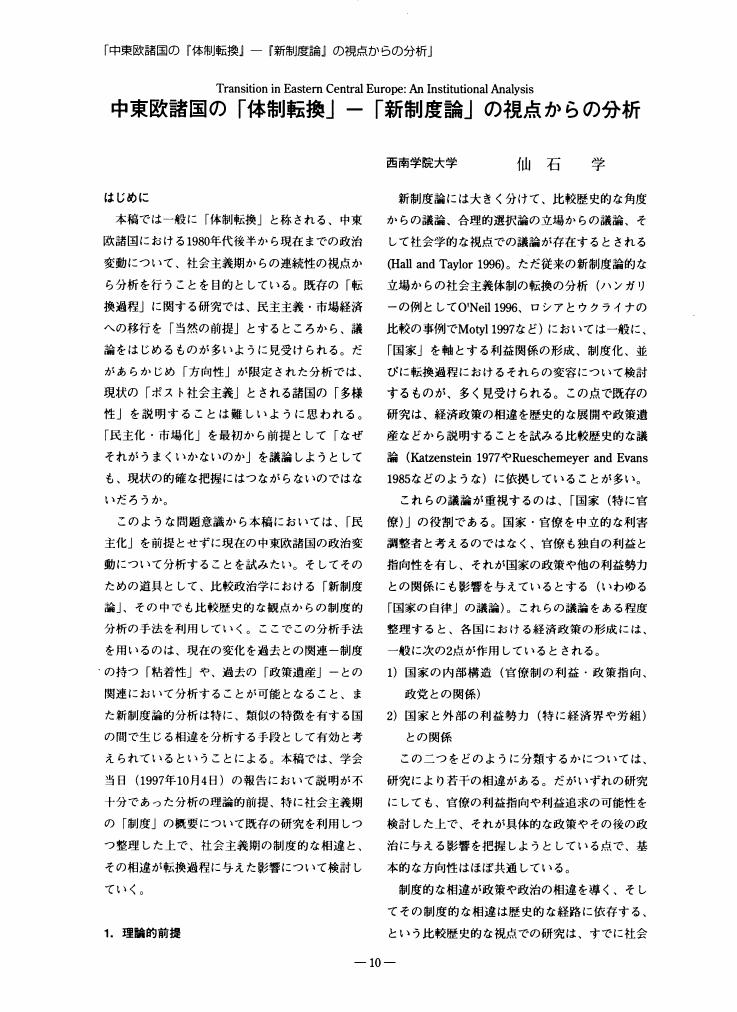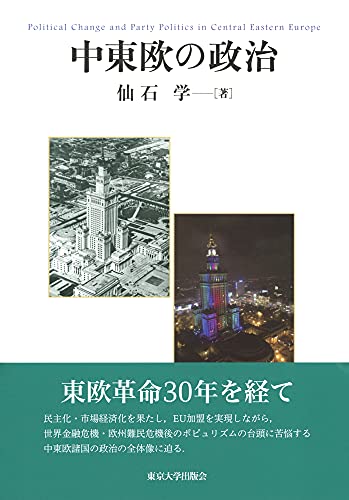6 0 0 0 OA 東欧のコミュニティ形成と地域公論及び広域公共財
本研究では環境問題をも含めて公共財としてとらえ、総合地球環境学研究所との連携により、文理協働型の議論を行った。この結果、従来の政治共同体を基にした地域設定による圏域の設定を超えて、環境に基づく圏域(環境広域公共圏)が現在問題になりつつあることが本研究の成果として明らかになった。また住民へのアンケート調査の結果として、想定していたよりも人々の社会的な流動性は高くなく、地域コミュニティの役割が以前よりも重要になっていることが新たな知見として判明した。
3 0 0 0 OA 中東欧諸国における子育て支援策の変容―世界金融危機以後の状況から
- 著者
- 仙⽯ 学
- 出版者
- ロシア・東欧学会
- 雑誌
- ロシア・東欧研究 (ISSN:13486497)
- 巻号頁・発行日
- vol.2021, no.50, pp.59-71, 2021 (Released:2022-06-11)
- 参考文献数
- 24
The article documents and compares the childcare support policy reforms in Central Eastern Europe implemented after the Global Financial Crisis. On the one hand, Estonia and Poland have maintained or expanded their childcare support policies after the crisis. Especially, Poland has expanded both cash benefits for families and public childcare during this period. On the other hand, Hungary and Slovenia have decided to cut back on childcare support measures during this period. While Slovenia was forced to cut back on childcare support due to the financial crisis, Hungary has intentionally adopted policies of focusing on the middle class with children by expanding tax credits and reducing cash benefits. As a result of these policies, the employment situation for women improved in Estonia, but it worsened in Slovenia, and the situation remained largely unchanged in Hungary. As for Poland, despite the expansion of measures to support childcare, the employment situation of women has not improved. This situation is provably caused by the fact that the ruling party of Poland, Law and Justice (PiS) emphasizes on the traditional role of women based on Catholic values.
3 0 0 0 OA 選挙ガバナンスの比較研究
- 著者
- 大西 裕 品田 裕 曽我 謙悟 藤村 直史 高橋 百合子 稲継 裕昭 遠藤 貢 川中 豪 浅羽 祐樹 河村 和徳 仙石 学 福島 淑彦 玉井 亮子 建林 正彦 松本 俊太 湯淺 墾道
- 出版者
- 神戸大学
- 雑誌
- 基盤研究(A)
- 巻号頁・発行日
- 2011-04-01
本研究は、選挙ガバナンスが民主政治に与える影響を、比較政治学的に解明しようとするものである。本研究は、国際比較と日本国内の自治体間比較を通じて、選挙管理という研究上の大きな空白を埋める。調査結果、常識的見解と異なる二つのことが明らかになった。第1に、選挙の公平性、公正性は、国際的に推奨される選挙管理機関の独立性のみでは達成できず、より複雑な扱いが必要である。第2に、日本では選挙管理委員会の業務は画一的で公平、校正であると考えられてきたが、委員会や事務局の構成のあり方によって大きく左右される。それゆえ、市区町村によってバリエーションが発生している。
2 0 0 0 OA ジェンダーと反欧州 ―ポーランドにおける若年層の政治指向
- 著者
- 仙石 学
- 出版者
- 日本政治学会
- 雑誌
- 年報政治学 (ISSN:05494192)
- 巻号頁・発行日
- vol.72, no.2, pp.2_44-2_56, 2021 (Released:2022-12-15)
- 参考文献数
- 15
本論文においては、ポーランドにおける若年層の政党支持に関する傾向を検討した。現在のポーランドでは、若年層の男性は反欧州を主張する自由独立連合を、女性は女性の立場やLGBTの権利を重視する左派を支持する傾向がある。この点については、まずはそれぞれの政党が、法と正義の政権のもとでは自分たちの利益が反映されないと考える若年層をひきつけることにある程度成功したことが作用している。ただそこで政党支持にジェンダーの差が生じた理由としては、反欧州と反ジェンダーが 「EUからの強制への反発」 という点で結びついているという要因が作用している。今後は今の若年層が社会の中心となっていく中で、この対抗関係がどのように変化するかを検討することが、一つの課題となるであろう。
2 0 0 0 OA 中東欧諸国の「体制転換」―「新制度論」の視点からの分析
- 著者
- 仙石 学
- 出版者
- ロシア・東欧学会
- 雑誌
- ロシア・東欧学会年報 (ISSN:21854645)
- 巻号頁・発行日
- vol.1997, no.26, pp.10-18, 1997 (Released:2010-05-31)
- 参考文献数
- 15
2 0 0 0 IR ポーランド政治の変容:リベラルからポピュリズムへ?
- 著者
- 仙石 学 センゴク マナブ SENGOKU MANABU
- 出版者
- 西南学院大学
- 雑誌
- 西南学院大学法学論集 (ISSN:02863286)
- 巻号頁・発行日
- vol.49, no.2, pp.123-154, 2017-02
1 0 0 0 政党政治の変動と社会政策の変容の連関:新興民主主義国の比較
- 著者
- 仙石 学 松本 充豊 井上 睦 馬場 香織 油本 真理 磯崎 典世 横田 正顕 出岡 直也 小森 宏美 中田 瑞穂 上谷 直克
- 出版者
- 北海道大学
- 雑誌
- 基盤研究(A)
- 巻号頁・発行日
- 2020-04-01
本研究課題「政党政治の変動と社会政策の変容の連関:新興民主主義国の比較」は、世界金融危機の発生以後の新興民主主義国(主に東欧・南欧・ラテンアメリカ・東アジア)における社会政策・福祉枠組みの変容について、危機後の政治経済状況の変化に起因する「政党政治の変動」を軸に検討していくことを目的とする。特に世界金融危機の後に生じた既存政党の弱体化とポピュリスト系を中心とする新興政党の台頭が、危機以前に存在していた社会政策や福祉のあり方をどのように変革させたかという点に注目し、各国ごとの政党政治と制度変容の展開を検討すると同時に、これを体系的な形で比較分析を行うことを進めることとする。
- 著者
- 仙石 学
- 出版者
- 日本比較政治学会
- 雑誌
- 日本比較政治学会年報 (ISSN:21852626)
- 巻号頁・発行日
- vol.13, pp.1-32, 2011 (Released:2020-03-16)
- 参考文献数
- 21
1 0 0 0 OA 中東欧諸国の政策の規定要因分析試論 ―チェコとポーランドの環境政策を題材として―
- 著者
- 仙石 学
- 出版者
- ロシア・東欧学会
- 雑誌
- ロシア・東欧研究 (ISSN:13486497)
- 巻号頁・発行日
- vol.2004, no.33, pp.16-25, 2004 (Released:2010-05-31)
- 参考文献数
- 34
The purpose of this paper is to analyse factors influencing the policy making in Central Eastern European countries and is to claim that the legacies of the socialist regime have been influencing the current policy of these countries by taking examples of the environmental policy of the Czech Republic and Poland. Main discussions can be summarized as follows:1) There exists a difference between Polish environmental policy and Czech's environmental policy. While Poland has formulated systematic environmental protection system with advanced mechanisms since the socialist era, Czech's environmental policies, mainly relying on classical command and control tools, have been introduced after the collapse of the socialist regime.2) This difference cannot be explained by focusing on the political institutions because there exists little difference in political institutions between the two countries. It also cannot be explained by focusing on the party system of these countries, as the environmental issue has not worked as a cleavage for party competition in these countries during the transition period.3) The need to adapt the national law to the acquis communautaire (or the effect of what is called “Europeanization”) has some influence on the environmental policy of the two countries. However, this does not mean that the environmental policies of these countries have “converged.”4) It is likely that the institutional and policy legacies of the socialist regimes have influenced the current environmental policies, as the difference of the two countries had already existed during the socialist period. However this point needs further theoretical refinement.
- 著者
- クラインシュミット ハラルド 仙石 学
- 出版者
- JAPAN ASSOCIATION OF INTERNATIONAL RELATIONS
- 雑誌
- 国際政治 (ISSN:04542215)
- 巻号頁・発行日
- vol.1991, no.96, pp.69-84,L10, 1991-03-30 (Released:2010-09-01)
- 参考文献数
- 67
The article seeks to demonstrate the wide range influence of the principles of cultural nation-building in Weimar Germany. Cultural nation-building is understood as a set of administrative measures designed to build a ‘nation’ in Germany, held to be ‘split and torn’ by class struggles and pressures from abroad, by means of the cultural traditions as manifested in classical literature and art. These principles were laid down in the Weimar Constitution of 1919 (dealt with in section 2); and they were supported by the professional organizations of lower middle class artisans (section 3), the Social Democrat based popular education movement (section 4), and various intellectuals (section 5).Hence, while it has always been known that nation-building was an issue argued for by the right, it becomes clear that the issue received wide support also in the center and the moderate left. Therefore, the conclusion seems safe that the isolationist tendencies in Weimar Germany (as forming the basis for Nation Socialism) resulted from a general current in political life.
1 0 0 0 OA ポピュリスト政権の経済政策 ―ヴィシェグラード諸国の比較から―
- 著者
- 仙石 学
- 出版者
- 比較経済体制学会
- 雑誌
- 比較経済研究 (ISSN:18805647)
- 巻号頁・発行日
- vol.57, no.2, pp.2_15-2_24, 2020 (Released:2020-09-04)
- 参考文献数
- 30
- 被引用文献数
- 1
東欧のヴィシェグラード4カ国では,2019年12月の段階でポピュリスト的な政党が与党の座にあるが,その経済政策にはポーランドの法と正義のばらまき型,ハンガリーのフィデスの擬似ネオリベラル型,およびチェコのアノの折衷型という相違がある.この政策の相違は,主として各国の政党間の経済政策をめぐる対立の形の違い,並びに各政党の支持を求めるターゲットの違いから説明することが可能である.
本共同研究は、日本、韓国、イタリア、フランス、南欧諸国、中束欧諸国、EUを直接の対象とする、政治汚職・腐敗、クライエンテリズム、社会資本をめぐる、実証的・理論的・比較政治学的研究を行うことを目的とするものである。我々一同は、汚職・腐敗(corruption)とクライエンテリズム(clientelism)の区別に留意しつつ、クライエンテリズムを近代化の残滓と見る従来の考え方を批判的に乗り越えようとした。そのことは、同時に、汚職とクライエンテリズムの衰徴はパラレルに進行するとの楽観的見方を克服しようとするものである。従来の近代化論的視座は、汚職とクライエンテリズムを資本蓄積(=資本主義)、合理化(=官僚制化)、政治参加(=民主主義)の多様な要求がもたらす利益の共生=相反関係が構造化する権力構造の構造的・制度的産物と見てこなかったのである。汚職とクライエンテリズムは、行政効率の点で「潤滑油」として評価すべきなのか。両者は、社会的・経済的不平等あるいは経済発展を修正するための社会の周辺部分からの正当な要求として評価すべきなのか。それらは、「社会資本」/「道徳資本」の欠如によって強化される「悪循環」の結果として理解されるべきなのか。政治汚職・腐敗を規制する法律の強化はいかなる効果を持ちうるのか。あるいは選挙制度改革や地方分権化は汚職やクライエンテリズムの抑制の万能薬でありうるのか。こうした問いに答えるべく、我々は、広範な理論的アプローチと実証的証拠を駆使し、「腐った(corrupted)」・恩顧主義的(clientelistic)慣行を形成する歴史的・制度的・社会=文化的要因の解明に努力した。こうした作業の一端は、公開報告として、2006年度世界政治学会(International Political Science Association)福岡大会のRC06(Political Sociology)なるセッションにて2006年7月10日に行った。本研究にとって益すること大であった。研究成果の一部は、Junichi Kawata (ed.), Comparing Political Corruption and Clientelism (Hampshire : Ashgate)として既に上梓されている。我々は、本共同研究の知見が、我々が生きる時代の民主主義をよりよく機能させることに役立つものと確信するものである。
1 0 0 0 東欧おける地域社会形成と拡大EUの相互的影響に関する研究
本研究では東欧(旧ソ連のロシア以外のヨーロッパ部分を含む)地域社会全般を射程に入れ、EU統合が及ぼす影響、そして逆にEU拡大がEUに与える影響について包括的な研究を組織した。その中でハンガリー地位法制定を契機として全欧州的な問題となった主権国家論争を取り上げ、欧州統合における主権国家と国民、そして少数民族問題という具体的な論題を巡る国際会議を、本研究計画の総決算という意味を込めて、2004年10月にハンガリーのブダペストで開催した。この会議には日欧米だけでなく、インドやトルコを含む世界12カ国から研究者が参集し、さらに欧州で民族問題を担当する実務専門家も招聘して議論を深めた。この会議は東欧の少数民族問題を理論的、包括的かつ具体的に論ずる貴重な機会であったため、OSCEなどの全欧州的な国際組織から多くの傍聴者が参集し、ハンガリーのマスメディアも大きく取り上げた。この会議では東欧における冷戦後の地域社会形成が国民形成、国家建設、少数民族共同体形成の三位一体として進行したこと、そして問題解決のためには従来のEU統合の枠を越えた新たな市民権概念(fuzzy citizenshipなど)、あるいは柔軟な国境という考え方(flexible border controlなど)、さらにはネオ・ミディーバリズムなどの複合的アイデンティティが必要とされる、などの具体的かつ新たな知見が示された。こうした国際的共同研究の成果の一部は既に本研究代表者を編著者とする英文著書The Hungarian Status Law : Nation building and/or Minority Protection, SRC, Hokkaido University, Slavic Eurasian Studies Series, No.4, 2004として刊行され、さらにThe Status Law Syndrome in Post-communist Eastern Europe, SRC, Hokkaido University, Slavic Eurasian Studies Series, 2005として新たな知見が国際的に発信される予定である。


